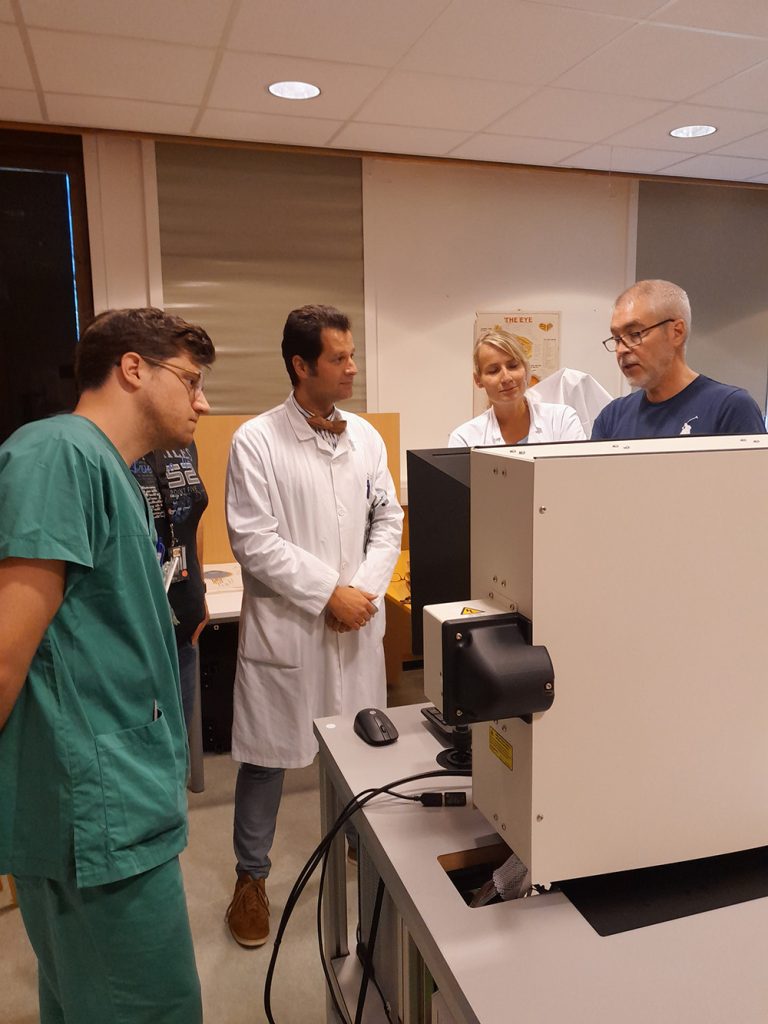About our research
Our foundational research which lead to the development of Profundus camera technology was pursued from 2008 to 2018 by researchers at University of Gothenburg and Lund University.
Our research team, with support from the Marcus and Amalia Wallenberg Memorial Fund and VINNOVA – the Swedish Government Innovation Agency, developed a unique dual conjugate adaptive optics proof-of-concept prototype for high resolution wide-field images of the human retina. The use of adaptive optics enables the prototype to acquire retinal images with a resolution on the order of a few micrometers, approximately 10 times better than the 15-20 µm achievable with conventional retinal imaging devices.
By implementing multi-conjugate adaptive optics, it allows for adaptive optics corrected retinal imaging over a 7 degree field of view.
The first demonstrator design was optimized and miniaturized into a transportable desktop proof-of-concept prototype designed for clinical use. A clinical validation phase was initiated to verify clinical relevance in comparison with established clinical methodologies. The overall purpose was to image patients with retinal disease and look for currently sub-clinical signs of retinal disease in e.g., diabetic retinopathy and other retinal vascular diseases, age-related macular degeneration, inflammatory conditions, glaucoma, and inherited retinal degenerations.

Publications
Thaung J, Knutsson P, Popovic Z, Owner-Petersen M.
Dual-Conjugate Adaptive Optics for Wide-Field High-Resolution Retinal Imaging. Optics Express. 2009;17(6): 4454-4467.
Popovic Z, Knutsson P, Thaung J, Owner-Petersen M, Sjostrand J.
Noninvasive Imaging of Human Foveal Capillary Network Using Dual-Conjugate Adaptive Optics. Investigative Ophthalmology & Visual Science. 2011;52(5):2649-2655.
Popovic Z, Thaung J, Knutsson P, Owner-Petersen M.
Dual Conjugate Adaptive Optics Prototype for Wide Field High Resolution Retinal Imaging, Adaptive Optics Progress, Dr. Robert Tyson (Ed.), ISBN: 978-953-51-0894-8, InTech, DOI: 10.5772/53640.
Popović Z, Owner-Petersen M, and Thaung J. (2011)
Non-invasive dual-conjugate adaptive optics imaging of human foveal capillary network. Engineering the Eye III, Benasque, Spain.
Posters
Popovic Z, Thaung J, Svensson B, Owner-Petersen M.
Evaluation of a Dual-Conjugate Adaptive Optics Clinical Prototype for Retinal Imaging, ARVO Meeting Abstracts June 16, 2013 54:5548
Popović Z, Owner-Petersen M, and Thaung J. (2006)
Wide-field dual-conjugate adaptive optics instrument for retinal imaging. Engineering the Eye II: Imaging the Retina, Galway, Ireland.
Thaung J, Popović Z, and Owner-Petersen M. (2007)
Dual-conjugate adaptive optics instrument for wide-field retinal imaging. The 6th International Workshop on Adaptive Optics for Industry and Medicine, Galway, Ireland.
Sjöstrand J, Knutsson P, Popović Z, and Thaung J. (2009)
Clinically useful wide-field high-resolution retinal imaging with a dual-conjugate adaptive optics instrument. EVER, Portorož, Slovenia.
Popovic Z, Thaung J, Knutsson P,1 Owner-Petersen M (2011)
Non-invasive dual-conjugate adaptive optics imaging of human foveal capillary network
